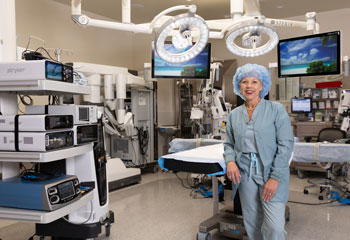Stem Cell Transplant
If you have leukemia, lymphoma, myeloma or sickle cell anemia, a stem cell transplant offers immense hope.
A stem cell transplant—including bone marrow transplants—can significantly improve survival rates for many blood disorders and cancers.
We replace diseased or damaged marrow with new stem cells and meticulously guide your progress.
Our approach to CAR T-cell therapy
Our approach to your care is empathetic and patient centered. We make strong, evidence-based treatment recommendations based on your specific diagnosis. We also listen, taking your preferences and concerns into account. Blood cancers like leukemia, lymphoma and myeloma sometimes don’t respond well to traditional treatments like radiation and chemotherapy. CAR T cell therapy is an innovative, possibly life-saving option for advanced disease that is not responding well to other therapies. At UCI Health, we pride ourselves on curiosity and robust communication between departments and dozens of medical specialists.
This collaborative approach is especially vital when navigating complex, treatment-resistant cancers. [H3] Our multidisciplinary collaboration consists of two teams Those teams are a) our internal team of physicians, pharmacists and nurse practitioners and b) the specialists that help you if you have complications. Overall, this includes: Oncologist Hematologists (doctors who specialize in blood conditions) Radiation oncologists Nephrologist (kidney specialist) Pharmacist (to deliver drugs before the infusion and treat side effects) Neurologist (to guard against neurotoxicity) Experts in immunology, infectious disease, pulmonary , cardiology, gastroenterology, dermatology and transfusion medicine Transplant coordinators, nurse practitioners, social workers, integrative medicine specialists, dietitians and support groups How we work with each other and with you Usually a hematologic oncologist will refer you to get CAR T cell therapy treatment. We also get oncologist referrals. Once you’re here, we’ll administer blood and other tests. If a thorough medical evaluation reveals that you’re a strong CAR T cell therapy candidate, it could save your life. We’ll have you come for an in-depth consultation where you’ll share your medical history and past treatments. Your doctor will explain what you can expect and the risks and benefits of CAR T cell therapy. We’ll also discuss what daily caregiver support you’ll likely need after treatment.
What is a stem cell transplant for cancer?
A stem cell transplant is a multi-step process that helps cure blood cancer.
- We harvest the stem cells
- We freeze and store them for later use
- You undergo “conditioning,” high dose chemotherapy, possibly combined with radiation, to kill your cancer cells
- We infuse the stem cells into your bloodstream
From there, the stem cells will travel to your bone marrow and begin creating new, healthy blood cells. We may give you post-transplant maintenance therapy—it depends on your specific needs.
What’s the purpose of a stem cell transplant?
- Rescue healthy bone marrow cells before a cancer treatment that requires high doses of chemotherapy or radiation
- Replace diseased or damaged marrow with new stem cells
- Provide new stem cells that can help kill your cancer cells directly
Am I a candidate for stem cell transplant?
We offer stem cell transplants when other treatments have not been successful, or after a relapse. Your doctor will tell you if you’re a potential candidate for this treatment. Whether you qualify or not depends on the results of our detailed evaluation.
Then we provide you with a customized treatment plan. We tell you about the risks, benefits and potential side effects. We always make recommendations that minimize toxicities and maximize your treatment outcome.

A stem cell transplant can save your life
The treatment period for blood and lymph cancers is months long. Our internationally recognized experts provide full pre-and-post transplant follow-up.
Call 714-456-8000 to make an appointment to consult with an expert.
Benefits of stem cell transplants
A stem cell transplant:
- Revives your blood cell production
- Fights cancer cells
- Replaces damaged marrow with healthy stem cells
- Can improve quality of life
Benefits of autologous transplants
When you’re the source of stem cells for a transplant, there is little to no risk of rejection. Because the stem cells come from your own immune system, they’re safer than allogeneic transplants
Benefits of allogeneic transplants (stem cells from a donor)
When you use a donor’s stem cells, you’re borrowing the power of their immune system to fight your cancer. That immune system may attack your cancer cells, but there’s also a risk it will attack healthy tissue.
Your doctor will discuss what type of stem cells are best for you based on your diagnosis and overall health.
How to prepare for stem cell transplant treatment
Your doctor will share with you all the pertinent details during your consultation.
But this is typically how to prepare for a stem cell transplant:
- To qualify for a transplant, you’ll undergo pre-transplant evaluations that assess your immunity, organ and systems function
We’ll make sure your heart and lung functions are normal, look at your disease status and your feasibility for this procedure - Your doctor will describe each step of the transplant procedure and the treatment’s benefits and risks
- It’s important to stay positive yet understand and prepare for potentially serious complications
- Complications can come from chemotherapy “conditioning,” a suppressed immune system or other sources
- You’ll arrange for caregiver help ahead of time and share your post-treatment care plan with your doctor
- Pack and prepare for approximately a three to four week hospital stay
What happens after my stem cell transplant?
After you’ve had a stem cell transplant, you’ll stay in the hospital for three or four weeks. Because you will be immunocompromised, you’ll be in an infusion area called ATC. We’ll monitor you and give you transfusions and different treatments as needed.
Then you'll remain under medical care for several months. In follow-up appointments:
- You’ll meet often with your care team - once a week at first, then once every two weeks and eventually less frequently
- We’ll monitor your immune system and your body's acceptance of the transplant
- We’ll administer important tests like blood count, blood chemistry, imaging and bone marrow aspirations; we’ll do different tests to monitor for endocrine abnormalities
- You will likely need blood transfusions
- We’ll administer all the vaccines you received as a child
- We will treat any side effects
Post-transplant life will be different, and you’ll need rest. You can expect to take six to 12 months or less to recover. We recommend working with an at-home caregiver during that period.
If you need emotional and practical support, please reach out to our Cancer Support Services to connect with a social worker or chaplain. After your treatment, we strongly recommend our Cancer Survivorship Services, a program that offers cancer screenings and post-treatment support.
Why choose UCI Health for stem cell transplants?
We’ve launched the UCI Health Hematopoietic Stem Cell Transplant and Cell Therapy program.
It is the first program of its kind for adults in Orange County who are navigating blood cancer. It’s the only such program that is available locally.
These life-saving infusions of healthy blood stem cells can benefit those of you with leukemia, lymphoma or multiple myeloma.
If you have other cancers, including solid tumors, you could benefit from experimental immunotherapy options such as CAR T-cell therapy.
We are Orange County's only National Cancer Institute-designated comprehensive cancer center.
We were awarded this designation because of our exceptional care.
That means you will:
- Be considered for early-phase clinical trials and advanced therapies before they’re widely available
- Have access to front-line diagnostics and state-of-the-science equipment
- Have a higher chance of recovery compared with non-NCI-designated comprehensive cancer centers
One of our Stem Cell Transplant team members is an international leader.
Stefan O. Ciurea, MD pioneered the use of haploidentical donors for stem cell transplantation. “Haploidentical donors” means that the donor is what’s called a half-match.
That means the donor is a close relative like your parent or child. Your body is more likely to accept a half-match.
Ciurea also uses a promising new approach in our program. He employs natural killer (NK) cells to lower the risk of relapse after transplantation.
As an academic medical center, we offer robust, ongoing clinical trials.
We are working on trials that decrease the rate of infectious complications and consequently decrease treatment-related toxicity and mortality. We also focus on the prevention of disease relapse after the transplant.
If you qualify and there is an appropriate trial that’s available, you may have access to novel treatments not available anywhere else.
Featured Blog Posts

'Get your mammogram,' urges breast cancer survivor
Annual screenings can detect breast cancer early, when it is most treatable, says UCI Health breast cancer survivor Barbara Cortez.

Rethinking surgery for a next-generation hospital

Appendix cancer survivor relishes life and giving back
Grateful to be alive, Kat Kitchen is volunteering for the UC Irvine Anti-Cancer Challenge, where she and her daughter will offer anti-inflammatory light therapy.
Upcoming Events
Ride, run and walk for cancer research
3-4 p.m.
Healthy Living Series
4-5 p.m.
Young Adult Cancer Support Group
The Young Adult Cancer Support Group provides help and support for individuals with cancer between the ages of 18 and 35 receiving active cancer treatment.




